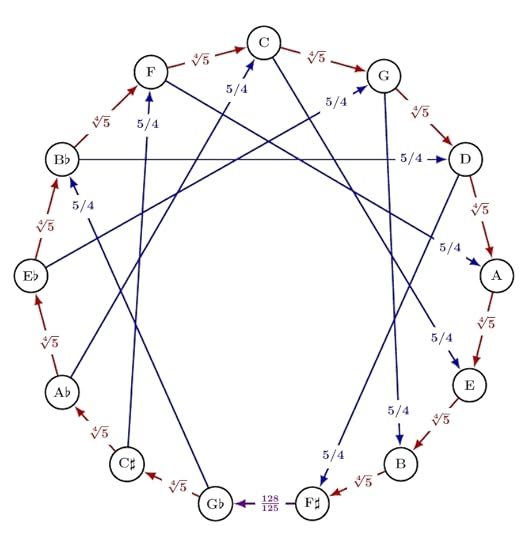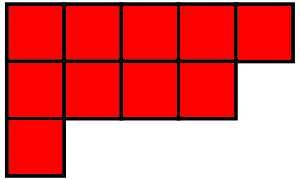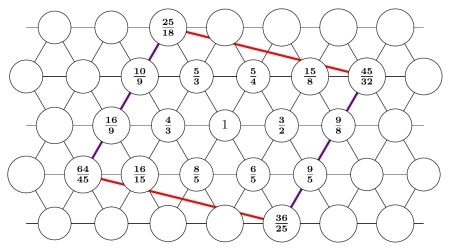John C. Baez's Blog, page 13
December 18, 2023
Quarter-Comma Meantone (Part 2)

Last time I introduced ‘quarter-comma meantone’, the tuning system shown above. Today let’s see if we can understand all the numbers in this picture.
You see 13 circles with letters in them standing for tones in a scale, connected by arrows labeled by numbers. The numbers are the frequency ratios between these tones:
• The blue arrows are ‘just major thirds’, with a frequency ratio of 5/4. It’s the quest for a 12-tone scale with a lot of just major thirds that led people to quarter-comma mea...
December 13, 2023
Quarter-Comma Meantone (Part 1)
I’ve spent the last few weeks drawing pictures of tuning systems, since I realized this is a good way to show off their mathematical beauty. Now I’ll start deploying them!
I’ve already written about the first two hugely important tuning systems in Western music:
It’s time to introduce the third: ‘quarter-comma meantone’.
But first, remember the story so far!
Pythagorean tuning may go back to Mesopotamia, but it was widely discussed by Greek mathematician...
December 4, 2023
Adjoint School 2024
Are you interested in applying category-theoretic methods to problems outside of pure mathematics? Apply to the Adjoint School!
Apply here. And do it soon.
• December 31, 2023. Application Due.
• February – May, 2024. Learning Seminar.
• June 10 – 14, 2024. In-person Research Week at the University of Oxford, UK.
Participants are divided into four-person project teams. Each project is guided by a mentor and a teaching assistant. The Adjoint School has two main components: an online learning sem...
December 1, 2023
Seminar on This Week’s Finds

I wrote 300 issues of a column called This Week’s Finds, where I explained math and physics. In the fall of 2022 I gave ten talks based on these columns. I just finished giving eight more! Now I’m done.
Here you can find videos of these talks, and some lecture notes.
Young diagrams and classical groupsYoung diagrams are combinatorial structures that show up in a myriad of applications. Among other things, they can be used to classify conjugacy classes in the symmetric groups Sn, irreduc...
November 25, 2023
What Can Mathematicians Do About Climate Change?
For my Fields Institute project on Mathematics of Climate Change, I’m trying to compile a list of ways that mathematicians can help the human response to climate change.
Here’s a short list, with reading material for each one. I threw it together quite quickly. I’m sure I left out some big important topics, and I probably haven’t found the best reading material for many topics. Can you help out?
Before you try:
Note that right now I’m looking for topics that are abstract and general enough th...
November 23, 2023
Agent-Based Models (Part 4)
I learned a lot from the comments on Part 3 and also this related thread on the Category Theory Community Server:
• Coalgebras, operational semantics and the Giry monad.
I’d like to thank Matteo Cappucci, David Egolf, Tobias Fritz, Tom Hirschowitz, David Jaz Myers, Mike Shulman, Nathaniel Virgo and many others for help. This list is not inclusive, and I apologize to everyone I left out. Sorry! To see who said what, please follow the links and read the discussions there.
I’d like to summarize ...
November 17, 2023
Just Intonation (Part 5)
In Part 3 we saw that in just intonation there are four candidates for the tritone. They are simple fractions close to the square root of 2. We saw that they lie at the corners of a parallelogram in a diagram called the tone network, or Tonnetz:
To get a 12-tone scale from this parallelogram, we need to think about the tiny differences between these 4 numbers. More precisely, since our ear hears frequency ratios, we need to think about the ratios of these 4 numbers, which are close to 1. Be...
November 15, 2023
Just Intonation (Part 4)
In Part 2 we saw there are some choices required when trying to pick a 12-note scale in just intonation:
tonic 1minor 2nd16/15major 2nd10/9 or 9/8minor 3rd6/5major 3rd5/4perfect 4th4/3tritone25/18 or 45/32 or 64/45 or 36/25perfect 5th3/2minor 6th8/5major 6th5/3minor 7th16/9 or 9/5major 7th15/8octave2Theoretically, there are
2 × 4 × 2 = 16choices. But one is more popular than all the rest—at least in theory. Today I wan...
November 14, 2023
Agent-Based Models (Part 3)
By next summer I need to understand agent-based models well enough to help people design better software for such models using category theory. And recently this project has been folded into an even larger project: mathematics for climate change. That is: modeling what people do, well enough to help us deal with climate change.
So, I’m scrambling around desperately trying to find a good framework for agent-based models! It needs to be general enough to handle many kinds of models being used....
November 13, 2023
Mathematics for Climate Change
Some good news! I’m now helping lead a new Fields Institute program on the mathematics of climate change.
You may have heard of the Fields Medal, one of the most prestigious math prizes. But the Fields Institute, in Toronto, holds a lot of meetings on mathematics. So when COVID hit, it was a big problem. The director of the institute, Kumar Murty, decided to steer into the wind and set up a network of institutions working on COVID, including projects on the mathematics of infectious disease ...
John C. Baez's Blog
- John C. Baez's profile
- 29 followers




